#meaning we're essentially isolated from the rest of the world
Text
wondering whether i should like. talk about my situation at all?
(okay i ended up rambling in the tags so here they are)
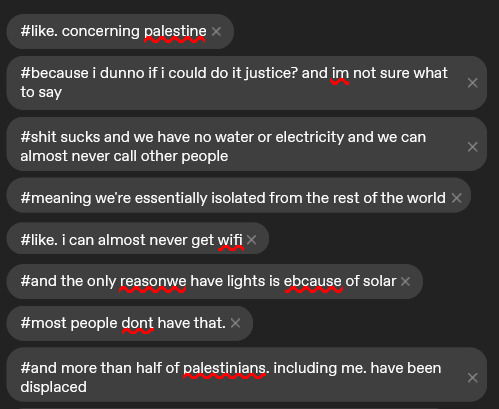


i just want to say that im terrified. everyone i know, everyone i care about, could be dead right now. i have no way to know. its so scary. everything i know has been ripped away from me and im just. scared. i miss having a normal life and im sick of this. its been more than 3 weeks and i dont know when itll ever end. nowhere is safe and i dont know if my house is okay and i just want everything to be normal again
#like. concerning palestine#because i dunno if i could do it justice? and im not sure what to say#shit sucks and we have no water or electricity and we can almost never call other people#meaning we're essentially isolated from the rest of the world#like. i can almost never get wifi#and the only reasonwe have lights is ebcause of solar#most people dont have that.#and more than half of palestinians. including me. have been displaced#im currently living in a tiny apartment with another family#we dont get much food#and we can almost never shower#and im just.#i cant see how people consider this a conflict#this is genocide#war against hamas my ass#the majority of people killed were citizens#theyre bombing residential buildings without warning#the buildings right. beside me were bombed#it was terrifying#i woke up to the windows breaking and dust EVERYWHERE and i couldnt. breathe#thankfully the hosue is still up so i still have a place to live#BUT SO MANY PEOPLE DONT#THOUSANDS OF PEOPLE ARE CRAMMING INTO SCHOOLS#WHICH DONT HAVE CLEAN WATER OR FOOD#i feel like im screaming into a void but#yeah. ig#palestine#free palestine#dont know how to tag this <3#long post
33 notes
·
View notes
Note
I’d love to hear more about the terrible thing at the edge of the lake! It’s really well written, and idk if i was just projecting or if you’re so skilled that you made it clear that Anthony lived his childhood as a girl without ever really saying it. Genuinely, i don’t know how you did that.
lake story commentary under the read more >:)
yeah i mean, as you say, the crux of this story is that our narrator is a trans man. i threw in a handful of clues that gestured towards the fact:
the name being the very first thing we learn about him, and the fact that he takes pride in it (& feels the need to share that pride with his "audience"). it's a chosen name; he is a pretty pretentious guy, and he wants us to see the artistry behind it. the story closes with him telling us that he "[has] been Anthony Misha Cohen ever since" he entered the lake; with what the lake represents in the story, this is him telling us that he decided to transition.
that the dead fox "made no advances" on the dead rabbit, and "thus disproved that claim to all of Nature’s predispositions being wholly ineluctable"; this is, of course, a gesture towards biological determinism. anthony points it out to us because that's what he's trying to focalise in telling this story. a lot of the piece is about agency versus inevitability, what we do and what is done to us. in the end, he chooses to act rather than be acted upon, which is how he is able to articulate his transness.
that one of the body parts thrown up by the lake is a severed breast; ha ha, top surgery, etc. looking at this more broadly, the narrative focus turning to these individual, isolated body parts ("Ought the lake to have thrown up a whole human body for my taking? It never did.") was intended to speak to a sense of alienation induced by dysphoria.
to speak a little more broadly, the story is in part about finding yourself coming into conflict with narratives of "coherence," which is to say, normativity, and (as i glossed in the second bullet point) about agency vs. subjectivity. i like to read the lake in the passage from streetcar that i referenced as representative of what lies outside the limits of heteronormativity; if you don't know, this specific passage has blanche describe the time she accidentally caused the suicide of her gay husband by revealing to him that she saw & was disgusted by his sexual relationship with another man. when he shoots himself, he becomes a 'terrible thing at the edge of the lake,' and i'm caught by his being, specifically, a 'thing'; for the rest of the play, he & his death come to metonymically stand for the essential failure of heterosexuality & sexual normativity that leads blanche to eventual ruin. he ceases to be a person and becomes a piece of metonymy; a signifier of the possibility of queerness, and the social paradigms that such a possibility threatens to rupture. this slots in well with my interest in spatial demarcation in fiction as a process of marking the boundaries of hegemony; all of streetcar takes place in one apartment, and who can and cannot live comfortably within the borders of the apartment aligns entirely with who can and cannot live comfortably within the borders of heteronormativity. compare apartment to lake; if the 'thing at the edge of the lake' is allan grey, and is therefore the possibility of queerness, then the lake itself is the repository, in a sense, for everything that sexual normativity & hegemony fundamentally cannot absorb.
& that's what anthony's lake is! ofc we're talking about transness in my story, but i'm playing around with the same essential idea of something that exists through its abjection & its absence, made sense of through its presumed impossibility. & it sets him at odds with his family, none of whom can see it. long before he can put words to what he wants, he has to live with the physical presence of the lake, & how that presence moulds his interfacing with the world even as he is the only person able to "see" it. as i said, i'm playing with the idea of spatial zones as standing in for discursive ones; the lake represents the marginalised, peripheralised forms of gender + sexuality by which sexual normativity + hegemony has to make sense of itself, and anthony lives with a heightened awareness of their existence before he has the language or the frameworks to properly recognise them. similarly, even people who cannot "see" the lake (for whom sexual normativity is naturalised such that the lake's "function" can become, in effect, background noise) can read this accidental departure from the norm into his affect.
& this idea of course brings us to the eyeball which provokes what is discursively figured as transition. i wrote this as an inversion of blanche's "I saw! You disgust me!" - when blanche "sees," queerness is no longer a distant & peripheral construction shoring up her understanding of heterosexuality without her ever having to confront it, but is instead in her immediate vicinity, and her response is to set off the chain of events that restore allan to "the edge of the lake" and to metonymic signifier. when anthony is "seen," by the lake itself, the world made possible by the lake is -- again -- no longer distant & peripheral, but immediate, and confrontational ("nothing but the water to distinguish it from me") (this is also why i referenced clare quilty, and vladimir nabokov/vivian darkbloom -- lolita doppelgangers strike a similar chord to this moment!). unlike blanche, his response to seeing and being seen is to finally admit to himself that the world represented by the "lake" is the world to which he wishes to belong. it's important that this is a conscious and deliberate choice -- throughout the story, it's always possible for anthony to remain, essentially, an unhappy girl, and to grow up into an unhappy woman. he tells us as much -- "But there were practical reasons for which I between the ages of eleven and twenty-one felt that I could not merely become that which I anticipated so fervently. If the lake were to take me—as I was certain it intended to do—I for so long committed resolutely to the idea that it had to be a happy happenstance, a fortuitous accident by which I could willingly and joyously forfeit all agency in the matter. I lasted so long in this state." anthony knows, at some level, what he is, but he spends a long time trying to make sense of it without having to act. when he is finally "seen," he acts, and this to me is a useful way of thinking about transness; not as deterministic inevitability, but as an expression of gendered agency.
i don't want to break it down sentence-by-sentence because i feel like that takes a lot of the fun out of reading it, but i hope this commentary was helpful -- i love this piece, i was dying to talk about it.
25 notes
·
View notes
Text
The Art of Imperfection
Summary: Dazai tries to find peace with his flawed self, from Dazai's POV
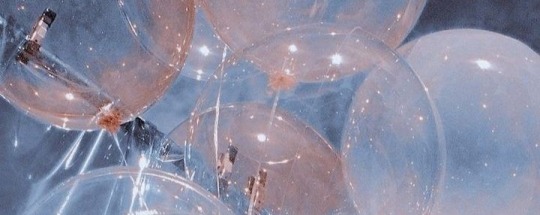

A/N: This is essentially a comfort fic for myself haha. Sometimes we're always striving for perfection in what we do and it can be draining and discouraging and I just want to write this as a reminder that imperfections are beautiful too.
Relationship: Dazai x reader
Warnings: Dazai thoughts (negativity and alienation)
Genre: Angst to fluff

My Masterlist
Perfection.
This solitary word is a common visitor whenever I sink into the depths of my mind. A bitter taste is left at my mouth at the mere thought of the distorted enunciation of its vowels, as it cautiously reaches at the tip of the tongue, feeling more like a curse with every passing second I attempted to utter it. But before I allow it to touch my lips, bit by bit it retreats to the gloomy interiors of my mind as it continued to haunt me, patronize me...
This word, this cursed word, is nothing but a constant reminder of my utterly flawed self, that juxtaposes the normalcy of humanity, that ridicules the essence of my existence that reflects nothing but the image of a disqualified human being... one too alien and defective to exist in the society that strives for the glimpse of ‘perfection’, whilst I fail to even accomplish even the simplest task of understanding the means to live.
And in the revelation of such a devastating truth, what more could one do but act the part as an attempt to blend into this so-called humanity? To put on a mask, as if I were in a masquerade and present this perfect and beautiful image of a ‘human being’ to the to the rest of the world, to entertain them like a puppet on strings with false smiles and laughers as if I were not numb internally... Constantly in the attempt to nurture, maintain and refine this mask that I could never take off in fear that the day my flaws are exposed, my world will crumble before my eyes and I cease entirely to be deemed as human, to be accepted by those around me...
Yet, it is also in my greatest attempt to connect with the rest of humanity, that my suffering is amplified... That the rift between myself and all others only widened even as I continued to long and seek for a sense of connection, belonging, only to be pushed back into a corner in my solitude for so long that I fear that I have lost the ability to communicate my utmost thoughts. Only serving to continue to trap me in my ever-isolated existence, as I sink ever closer into the depths of my existential despair.
So how is it that you are able to wear your flaws and weaknesses as if it were nothing but the clothes upon your skin? Wear your heart on your sleeve, as if the invisible cracks and scars that dawn your skin did not exist? As if you hadn’t been ridiculed by the world that caused so much suffering and pain? How do you make all these flaws that I hide away behind my smile so beautiful and beguiling without achieving the means of perfection that the world seems to demand?
From your credulous desire to continue to see the best in others, even in one such as I, a man who utterly lacks a sense of morality and is responsible for the deaths of countless lives. To your stubbornness and fire that continues to burn in your being, though at times prove to be difficult to handle, is nothing if not endearing and the roots of my adoration for you.
It is in these imperfections that I see the most you in the most authentic form of you. A kind of distinct and captivating charm that chants no one but your name. That reveals and exposes nothing but the humanity that I felt like I was desperately searching throughout my life.
And it is in this striking moment that I realize, that perhaps, perfectionism only degrades what is beautiful, for it diminishes the roughness around the edges that make anything enamouring. For what is so fascinating to understand about a robotic and artificial entity even if it embodies the essence of perfection?
Perhaps it is in the strive for perfection that we cease to become human...
And if you can find it in your heart to embrace all of my shortcomings... Then maybe, being flawed isn’t so bad after all.
#dazai x reader#dazai x oc#dazai x you#bungou stray dogs#bsd dazai#bungou stray dogs dazai#bsd anime#bungo stray dogs#bsd#bsd fanfiction#bsd fanfic#bsd fandom#bsd angst#bsd fluff#bungou stray dogs x reader#bungou stray dogs x you#bsd x reader#anime#x reader#perfectionism#kat writes📝#✒️ . he that reigns and lives within my thoughts
95 notes
·
View notes
Text
Honey, there's isolation and then there's isolation.
I've seen many chronically ill, neurodivergent, poor and disabled people discussing their bemusement at the cries of lament from the well-off able-bodied people who now have to self-isolate, cancel their plans, postpone holidays and miss out on fun events. It's quite something to behold. It’s fascinating (in a horrible way) to witness these people who are used to getting what they want now finding that they can't have it; that that instant gratification has been removed for them. Now they're staring down the prospect of being lonely for a few months, unable to see friends, sometimes even family, unable to go out to the movies or the festivals. And we're sitting here like, yo - welcome to our world.
It's hard to put into words how frustrating it is to see governments putting in measures for tele-health services, working from home practices and teaching through Skype to students et cetera. For decades, disabled/sick/neurodivergent folks were told that these accommodations couldn’t be made for us, but now suddenly they can. Now suddenly there's money for it. Funny that.
When we've talked about how lonely and isolated we feel as people with disabilities, we've been dismissed, victim-blamed or infantilized. But now the ableds are feeling it, a flood of “community compassion” initiatives and “mental health advice for dealing with isolation” is being made freely available to them.
And yet previously, we used to hear things like: “You're so lucky you get to stay at home: I wish I could just be on Netflix all day!” Or, “You don't have to deal with people. That sounds like utopia to me!”
Not so much fun in reality, is it?
The latest banger I heard was from my sibling. I told her that after a long winter, months of bushfires, unprecedented floods and now this virus, I had essentially been self-isolating for six months and another six months was going to make me lose my mind. Her response was, “well, at least you've had practice. This is all so new for the rest of us!”
Yes, I have had practice. I have developed strategies for dealing with crippling loneliness. I have had to find ways to entertain myself whilst experiencing horrific symptoms of pain, nausea, digestive issues and more. I've had to learn not to take it too personally when friends cancel on seeing me or sensing their disappointment/bemusement when I cancel on seeing them. Yes, I have had lots of practice. It doesn't make it any less awful though.
Australia has had a particularly bad run. The bushfires broke out in spring and for almost all of November and December we literally could not go outside because the air was toxic. The smoke blocked out the sun, rained apocalyptic ash and embers on us which sparked more fires. I have a compromised immune system and so I really felt the effects of the smoke. Red eyes, runny nose, sore throat - the works. That crushing, extended period of terror took a huge toll on me mentally, as well. Then, just as the smoke started to clear a little, the heat waves came. I'm talking about 48°C (113°F) days. You cannot go out in that. More people die from heat waves than most other natural disasters combined, and people were dying in Australia. People died from the smoke and the heat and that doesn't even include deaths from the fires themselves. Then the fires were put out not just by some heavy rain but by actual torrential flooding. So for a few weeks in February we were cooped up indoors unable to go out because the train lines had literally washed away and it was too dangerous to drive.
And then the coronavirus hit Australia.
Now everyone is being told to lock themselves in their homes. For many of us, particularly the chronically ill and most vulnerable, we've already had months and months of that. And bear in mind: I had to pretty much self-isolate all winter. Because such cretins like anti-vaxxers exist, it's really difficult for those with compromised immune systems to go out in winter and not get sick with the flu, which can be crippling or even deadly for us. Secondly, winter is extremely hard on my body. My pain gets infinitely worse in the cold weather. Last year I spent most of winter inside. I barely saw the sun. The only way I can get through those 3 to 5 months of cold is keeping in mind the prospect of spring and summer, when I can go out more often. But I couldn't go out in the spring and summer of 2019. My long stretch of being stuck indoors went on and on and on, and now I'm being told it could be another six months before I can go out again - just in time for the start of the next bushfire season.
After all the hardships we endured last year and after finally giving up running my not-for-profit due to worsening health, we really needed something to look forward to in 2020. I had no less than 14 medical appointments in the first eight weeks of this year. We spent thousands of dollars on seeing specialists and therapists to try to fix my broken body. The only time I would be out of the house was to see another medical professional. And then I broke up with my friend of 14 years (and his family), which led to me feeling more alone and more depressed. And then my elderly friend died at the end of February. Everything looked bleak.
Strapped for cash, my partner tried to think of affordable ways we could still have fun this year. We finally had our own home, so maybe we could invite people over. Our social lives really suffered while running the non-profit, especially with all the drama of last year, so this year we pledged would be different.
We spent half a day in February in front of our wall planner and planned boardgame nights, our birthday parties, dinners with friends and excursions at local festivals and markets. I felt my spirits pick up a little and hope stir in my heart.
All that has been cancelled now.
For someone who is chronically ill and alone most of the time, we live for these outings. We live for the moments of socialization and human bonding that we are otherwise deprived of so much of the time. These things are the light at the end of the tunnel of pain and nausea and sickness. So to have that taken away from us? There are no words to describe how eviscerating that emotional pain is.
To add insult to injury, we’re currently watching able-bodied people behaving even more despicably than usual. They descend like locusts on stores and rob the vulnerable, including our poorest regional communities (STILL RECOVERING FROM BUSHFIRES), of their food and resources. We’re witnessing them stepping over the disabled, sick and impoverished to panic buy all basic necessities. We hear them complaining about how hard it's going to be to give up seeing the football and to stay home with the kids these next few months. It's fucking galling. Now they are starting to taste what we have to experience, and yet there is still no consideration for what we’re going through.
Instead, we hear shit like: "The self-isolation thing is so annoying. I mean, it's only the sick and elderly who will die from it so I don't see why I can't go out to a concert!"
Only the sick and the elderly: this implies our lives have no inherent value. But I guess, under a capitalist system, that's how people see things.
I am just so goddamn tired. I’m tired of trying to be positive all the time when things are just terrible right now. I’m tired of being dismissed, ignored, or made to feel like a whiny burden. I’m tired of the hypocrisy. I am tired of the fear and selfishness and ugliness all around me. I’m tired of being sick and I’m tired of being punished for it.
This coronavirus has highlighted so many deep flaws with our culture and our economic system. It’s shown up humans for the self-centered, individualistic bigots we are. It’s illuminated how pathetic our treatment is of the world’s most vulnerable. It’s really underscored how incompetent our leaders are. Not that this will motivate anyone to change anything. Keep selfish, carry on.
And so it goes. Tomorrow and tomorrow and tomorrow…
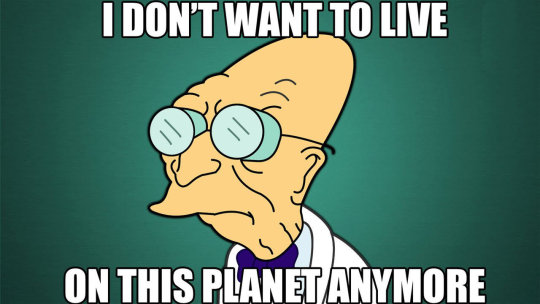
#spoonie rants#chronic illness#chronic pain#the ableds are at it again#abledsareweird#fuck ableism#coronavirus#covid19#Fibromyalgia#seriously Australia#get a grip#disability and isolation
144 notes
·
View notes
Text
Worldbuilding for beginners: Myths and Religion
This will be more of a short essay than the last one. Here goes.
Myths and religions are intertwined, inextricably linked. One affects the other in a continuous cycle, and (no offense meant) all religions are based on myths. Which comes first is a difficult question, but I'd say the myth. A myth is essentially a story no-one can prove isn't true, normally to do with some superhuman or deity or a related topic. At the centre of each and every religion is the creation myth. This details the construction of the world the religion is based in, or the creation of the deity (or deities) themselves.
That leads nicely on to my next point. Religions are either monotheistic (one god) or multitheistic (multiple gods). If the religion is the second type, how do the gods interact with one another? Are there rivalries, romantic relationships? Are any of them family? Ok, we're getting into Ancient Greek levels of potential incest here. I'll move on. If there are multiple gods, that means they represent different things. What?
Gods in multitheistic religions rarely keep to themselves. They normally interact with the sentient race to some extent, and myths will arise from this. If they don't interact, why? Did something happen? Was there any interbreeding between gods and the sentient race? Do the gods make their presence known in the present day?
In monotheistic religions, the god is supreme. None can challenge that god in terms of authority, but do they have a representative? How are they worshipped? Do sacrifices of any kind take place?
Due to myths, some places (Delphi, for instance, for the Ancient Greeks) become sacred. What are the sacred places of your specific religion? Do people take pilgrimages? Talking of regions, are different religions more prevelant in different areas? What happens when religious viewpoints clash?
Myths of the far past are one thing, but are there any semi-mythical characters still alive? Are there beings worshipped as gods that are tangible?
Myths tend to have a fairly standard plotline, with a trigger event that causes the hero to go on a quest. They will normally have several obstacles to overcome, then fight a "boss" of some kind. There is then the return, often taking longer than the rest of the quest (think Odysseus), and the "resurrection" as they turn up alive. Sometimes things go badly wrong. My best example is Theseus in the myth of the Minotaur. His father asked him to change the sail of his ship on his return to a fresh one if he defeated the beast. Theseus forgot this, and sailed home without changing the sail, only pausing to dump the girl who loved him on an isolated island (not cool, Theseus, not cool). Theseus' father, seeing the grey sail, leapt from a high cliff to his death.
Another major type of myth explains events or phenomena. Lightning is caused by Thor's hammer, for instance, or echoes by the voice of a nymph who faded away. What things in your world might people need myths to explain? Are there any myths that verge on history?
There is often a grain of truth in myths (well, I say often), so what could the origins of the myths themselves be? Did someone discover something? Did a great warrior/general defeat a powerful enemy, who became "monsters" by propaganda?
What about unbelievers? Are they persecuted? Do they have a place to go to find out about religions? Are there any religious groups that will harass you on your doorstep?
On that note, religious buildings. These tend to be dramatic structures (except for hardline sects), which draw attention. They have a fairly regular structure, with seats and somewhere for a speaker to address the congregation. Do people worship in these buildings, or elsewhere? When were the majority of these buildings constructed? Is there an official religion for the country?
Is music a key part of the religion? Any rituals? Any sacred days? In many religions, poems are written about key myths. Writers will regularly rewrite earlier myths to "improve" them, or fit with the current propaganda/leadership. How have myths evolved over time?
Do the gods have enemies? Is there a threat to the religion, a devil or an Aphosis, if you will? Do the gods "need" the sentient race to do a certain thing in order to be a true believer?
The Afterlife is a central part of any and all religions. Where do the believers go when they die? What about the unbelievers? Is reincarnation a thing, or heaven? Just a void? Is there an entity that collects souls?
Are the gods perfect, or flawed? What about the mythical heroes?
So, in summary:
Religions:
Number of gods
Relationships
Creation
Buildings
Afterlife
Myths
Propaganda
Representatives
Conflict
Myths:
Explanations
Quests
Truth
Propaganda
Heroes
Feel free to add anything you think I've missed! I'll try to add and credit any that seem good.
#worldbuilding#worldbuilding for beginners#writeblr#tips#writing tips#fantasy#sci-fi#myths#religion#writing help#help
58 notes
·
View notes
Text
US Democracy? Refer to What Bernie Sanders Said
— By Xin Ping | December 9, 2021 | New Straits Times
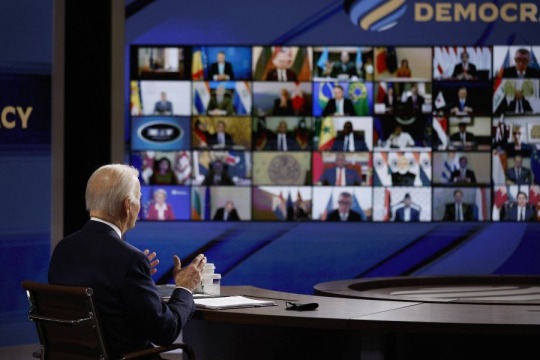
U.S. President Joe Biden looks at a video screen displaying the participants in the Summit for Democracy as he delivers opening remarks in the South Court Auditorium on December 9, 2021 in Washington, DC. - AFP PIC
In 2005, New Orleans was hard hit by Hurricane Katrina.
Flooding drowned the home of the evacuated and isolated those who chose to stay. The water eventually receded, revealing a hard truth. The people's darkest hour turned out to be a source of revenue - for the city's own mayor Ray Nagin. By using his position, Nagin strong-armed a businessman to fly his family first class abroad just two months after the disaster struck. Worst of all, he steered a business of the urgently-needed redevelopment to a granite company he owned with his sons.
The businessman-turned politician reaped what he sowed - a 10-year sentence in prison with more than 20 charges. But many US politicians like him got away from being held accountable.
"We're by no means the world leader in clean government," so said Harvard Law School Professor Matthew Stephenson, who observed that practices other countries would consider corrupt are, in the US, not only permitted but constitutionally protected. The most prominent of all goes to campaign financing and lobbying.
The law professor's finding certainly holds true in the Congress. Almost 40 percent of total contributions in the 2018 U.S. midterms came from mega-donors who contributed US$10,000 or more, who account for a tiny 0.01 percent of the US population. From 2010 to 2015 alone, according to a study by professors from Princeton and Northwestern University, the 200 most politically active companies in the US spent US$5.8 billion influencing the government with lobbying and campaign contributions.
Elected politicians are on the go, too. Different from their foreign counterparts hitting the road for field trips, US officials spend 30-70% of their time in office fundraising for the next election. For the rest of their business hours, they butter up major donors while doing their job, by making sure the laws they pass keep the big money happy.
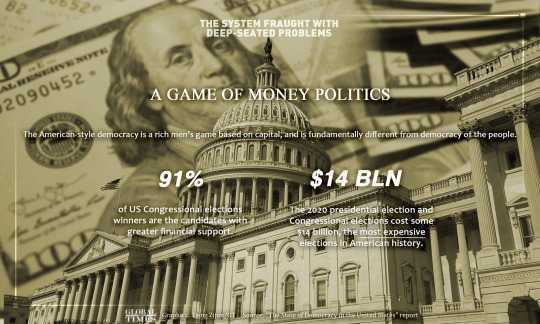
Otherwise, their seat will be easily taken by the more devoted ones. After all, nine out of every ten congressional elections in the US are won by candidates with the most financial support. So it is not cynical at all of Bernie Sanders to say "Congress Doesn't Regulate Wall Street. Wall Street Regulates Congress."
The people who Adam Smith called the "masters of mankind", following their maxim of "All for ourselves and nothing for anyone else", have made the US government of the one percent, by the one percent, and for the one percent. Ordinary Americans are thus left out of the political picture, especially after election seasons. They tend to share the feeling that the government doesn't really care what they think. Only twenty-four percent of respondents said in a Pew study in April this year that they trust the federal government, having been let down time and again on everyday matters. Their perception is backed by numbers. Political scientist Martin Gilens concluded that about 70 percent of the US population have no way of influencing policy. If that's not bad enough, check out the Princeton research that found the opinions of up to 90 percent of Americans have essentially no impact at all.
"There are two things that are important in politics. The first is money and I can't remember what the second one is." said Mark Hanna, an American businessman, a Republican Senator as well as chairman of the Republican National Committee over a century ago. The value of openness and frankness should be carried on generations later. It is now seldom mentioned in the US that the 2020 US presidential and congressional elections were the most "cash-burning" ones in the US history, after candidates spent a total of US$14 billion in campaigns. The presidential election alone cost as much as US$6.6 billion, also a record high.
The words of truth about US politics and the revelations that political donations don't just fall at no cost would naturally provoke some thoughts. As "Summit for Democracy" of the US with "addressing and fighting corruption" as one key theme, people wonder if the American hosts would feel a little bit uneasy or unsure to proudly raise the topic among representatives from half of the world.
There may be one quick fix: renaming the meeting "Summit for US Plutocracy" and drafting a checklist for self-correction.
China Brands US Democracy 'Weapon of Mass Destruction'
— By AFP | December 11, 2021 | New Straits Times
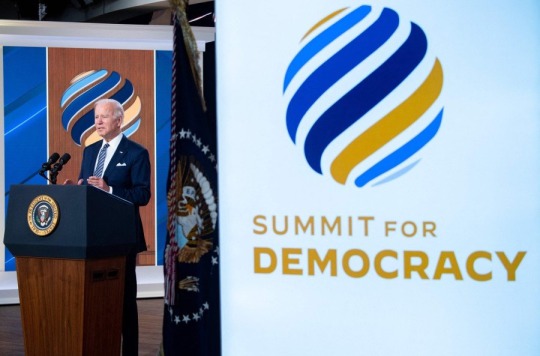
US President Joe Biden speaks during the closing remarks of the virtual Summit for Democracy in the Eisenhower Executive Office Building, adjacent to the White House, in Washington, DC, December 10, 2021. - AFP PIC
BEIJING: China branded US democracy a "weapon of mass destruction" on Saturday, following the US-organised Summit for Democracy which aimed to shore up like-minded allies in the face of autocratic regimes.
China was left out of the two-day virtual summit – along with countries including Russia and Hungary – and responded by angrily accusing US President Joe Biden of stoking Cold War-era ideological divides.
"'Democracy' has long become a 'weapon of mass destruction' used by the US to interfere in other countries," a foreign ministry spokesperson said in an online statement, which also accused the US of having "instigated 'colour revolutions'" overseas.
The ministry also claimed the summit was organised by the US to "draw lines of ideological prejudice, instrumentalise and weaponise democracy... (and) incite division and confrontation."
Instead, Beijing vowed to "resolutely resist and oppose all kinds of pseudo-democracies."
Ahead of the summit, China ramped up a propaganda blitz criticising US democracy as corrupt and a failure.
Instead, it touted its own version of "whole-process people's democracy" in a white paper released last week that aimed to shore up legitimacy for the ruling Communist Party, which has become increasingly authoritarian under President Xi Jinping.
While the US has repeatedly denied there will be another Cold War with China, tensions between the world's two largest economies have spiralled in recent years over issues including trade and technological competition, human rights, Xinjiang and Taiwan.
The US Treasury on Friday sanctioned two high-level Chinese officials for human rights abuses in the Xinjiang region and placed Chinese AI surveillance firm SenseTime on a blacklist for its facial recognition technology targeting the Uyghur minority.
Taiwan, a democratic self-ruling island that is claimed by China, was invited to the US summit in a clear snub to its larger neighbour.
But Beijing got a boost in the middle of Biden's summit when Nicaragua dropped its previous diplomatic alliance with Taiwan, saying it only recognised China.
The announcement leaves Taiwan with only 14 diplomatic allies. In response, the US State Department called on "all countries that value democratic institutions" to "expand engagement" with the island.--AFP
0 notes
Text
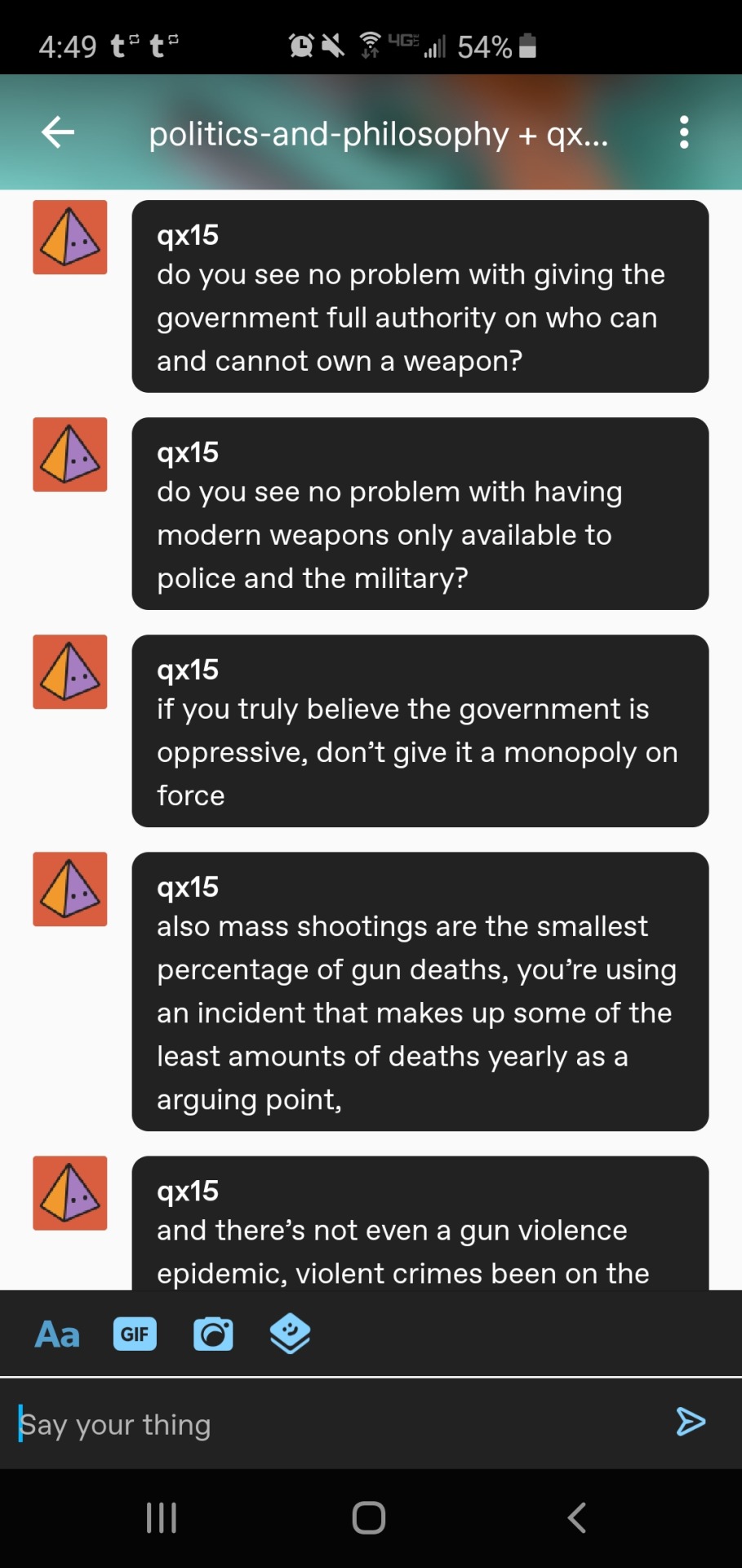
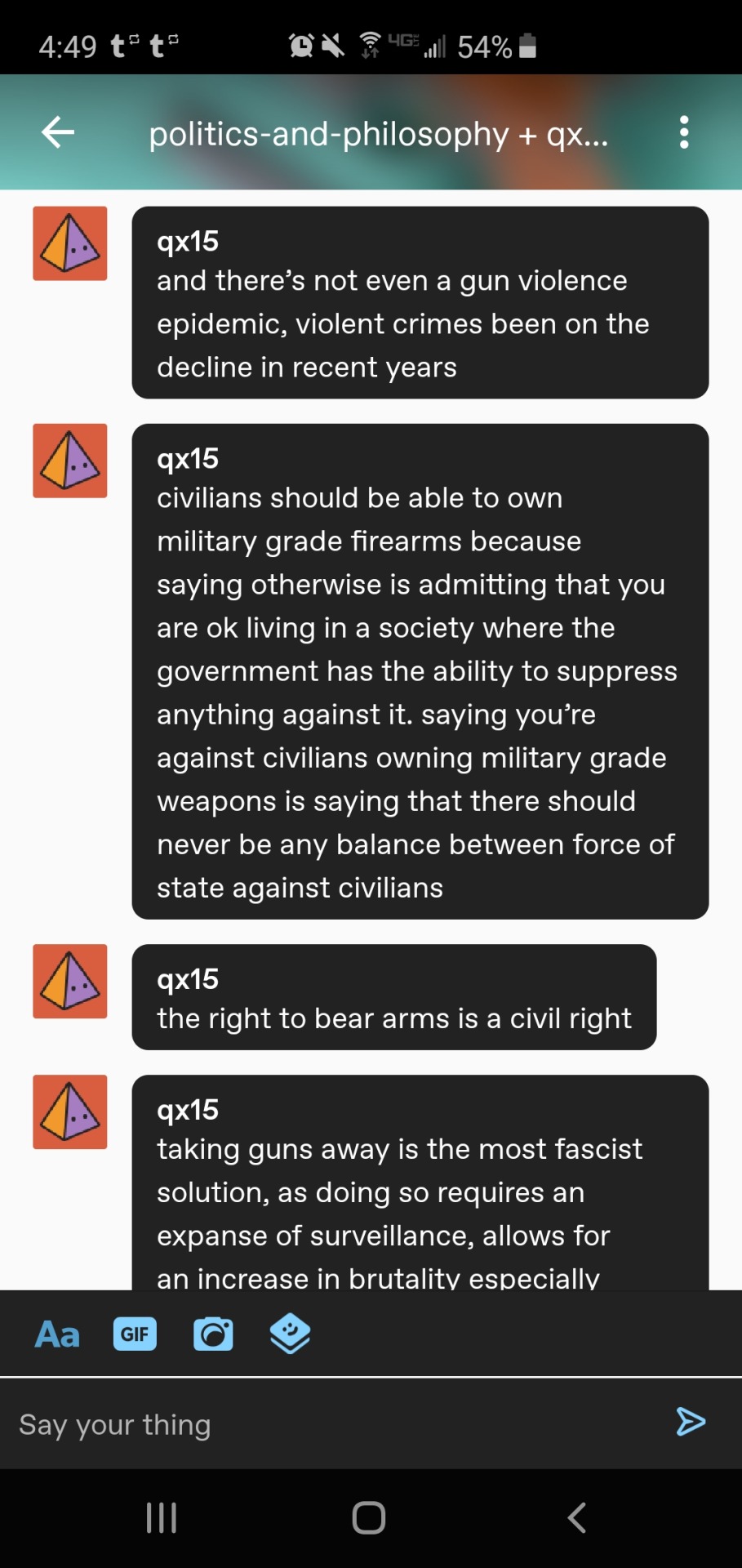
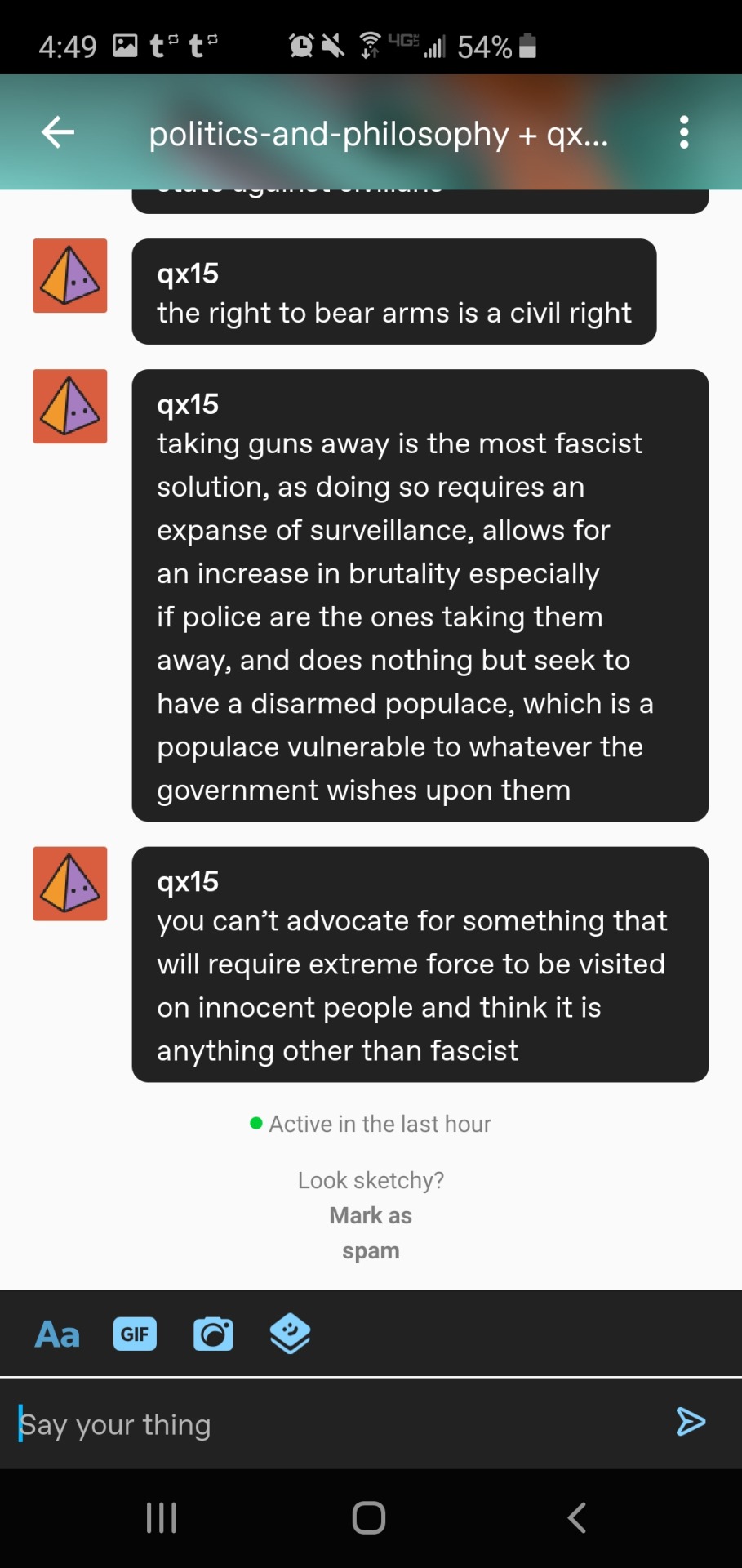
Ok, so I know that I'm supposed to be weirded out by the fact that this person clearly created a random brand-new tumblr just to message me anonymously, but honestly, I'm honored.
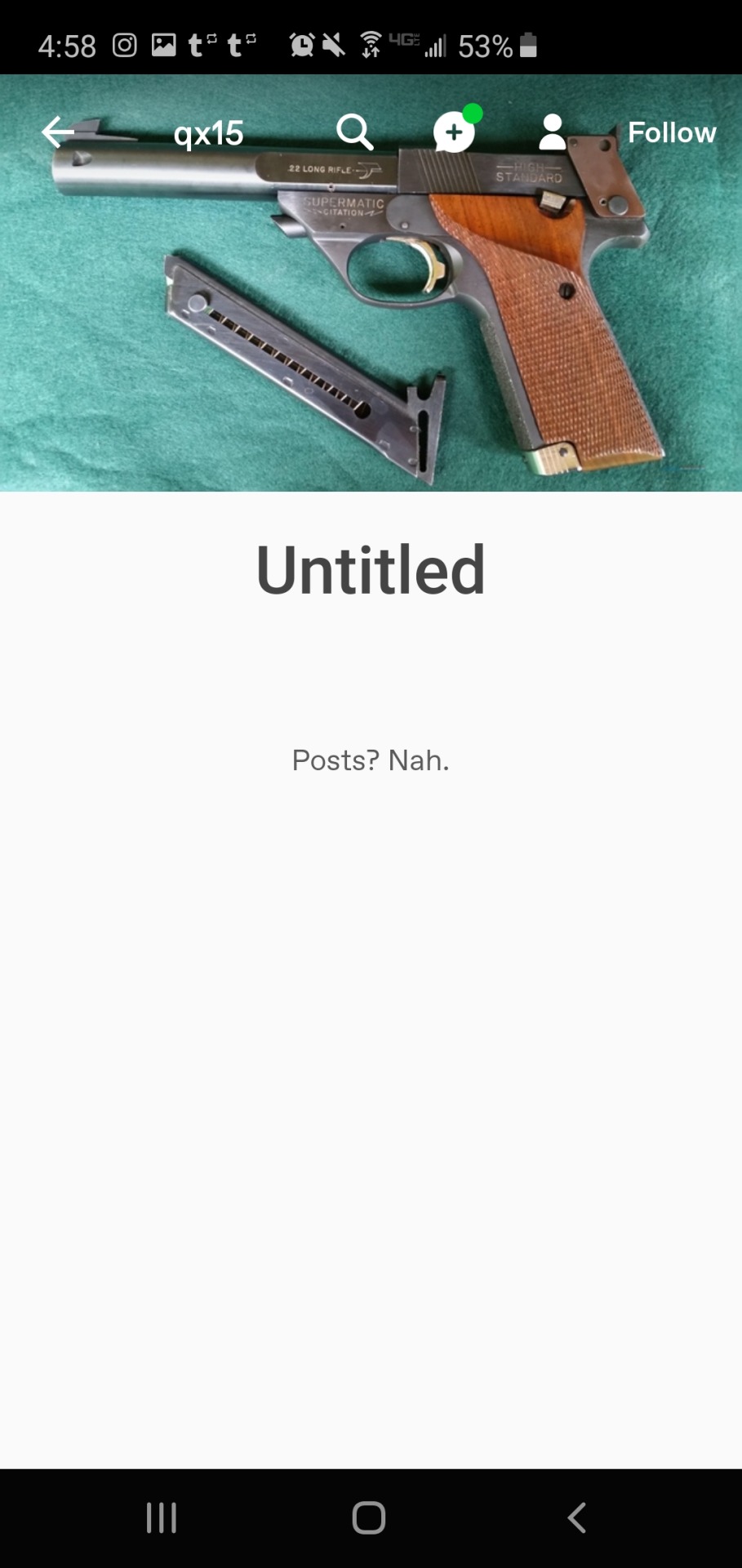
Look, this tumblr is straight-up blank, aside from the header photo. Is that a homemade handgun btw? It looks like it. Honestly though, I just feel kinda honored. Because this person is either scared enough of me to want anonymity (I can't see why) or scared enough of the reprisal they would face on their main blog (this one makes more sense).
So, again, let's go point-by-point.
I don't think the government should have control over who owns a gun in the same way I don't think the government should have control over who lives and dies. I think that gun ownership should be restricted constitutionally, by removing and replacing the second amendment. In this new amendment, I want only three types of individuals to be allowed to own guns:
1. Those in remote areas who require guns for survival.
2. Collectors of historic guns who can only load and fire them on shooting ranges.
3. Active duty military personnel deployed in foreign soil, and domestic soil only during a foreign invasion.
This list notably excludes cops, active duty military on domestic soil, security details, sport hunters, and everyone else. I have said all this before though.
This would not give a monopoly on power to the government, in fact, it would significantly stymie the power the government already has over people by removing the threat of firearms.
Personally, I think this would stop almost all gun violence, not just mass shootings. The majority of gun killings are committed with guns which were once legally owned (the US is a net exporter of illegal firearms, mostly to Mexico, due to our lax gun laws). Furthermore, while 4 in 5 gun homicides are committed with a gun not owned by the perpetrator, that's not the end of the story. 30% of those guns are stolen, but of those 30%, over 4 in 10 are not reported stolen until after a crime is committed, and 44% of gun owners whose guns were stolen did not respond to attempts to be contacted by police. Of the other 70%, reported lost, in 62% of instances, the legal owner of the gun was unaware of where or when the gun was lost. That is a staggering number of people who are reckless with firearm safety.
A large part of this is due to shoestring purchases, where someone who passes a legal background check will go and buy a gun for someone who wouldn't, or to then go and sell it at an upcharge on the black market, only to claim it lost or stolen when it shows up at a crime scene. The legal gun market directly supports and enables both gun crime and the illegal gun market. Making it more difficult to legally get a gun will make it exponentially more difficult to illegally acquire a gun. More on this later.
Mass shootings are a small percentage of total deaths, but these deaths are unique in how horrible, violent, and early in a person's life they come. They are always the direct result of hate, and are a uniquely American problem within the developed world. Unlike robbery murders or even homicides motivated by passion, mass shootings don't target a specific individual. They seek to kill a group of people indiscriminately. Essentially, they're a violent hate crime, almost always motivated by a right-wing view of society and a belief that violence solves problems.
It's also laughable that the ownership of a gun somehow puts you on even footing with the government. Do you know how much firepower the government has? Even military grade weapons are useless against an actual military.
Ok, here's Oxford's definition of a civil right:
Please go read this. Civil rights are rights of society and politics. They are things such as voting rights, marriage rights, freedom from religious infringement in your life, right to exist in society and politics. Gun ownership is no more a civil right than is the right to smoke crack.
America has a gun violence epidemic, compared to the rest of the world, and even compared among the states.
Here's a fun graph comparing gun violence and gun ownership among first world countries.
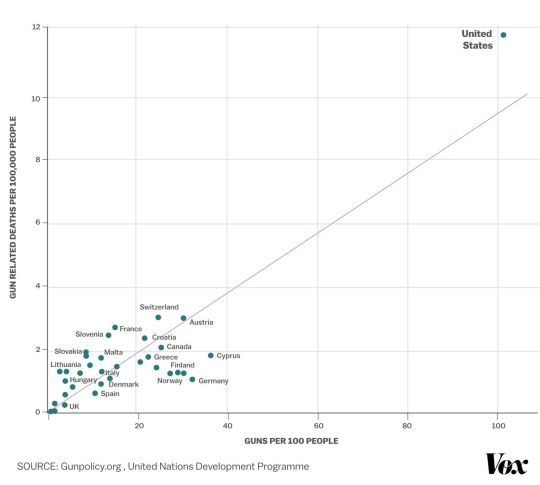
Here's a graph comparing gun violence and gun regulation within the United States:
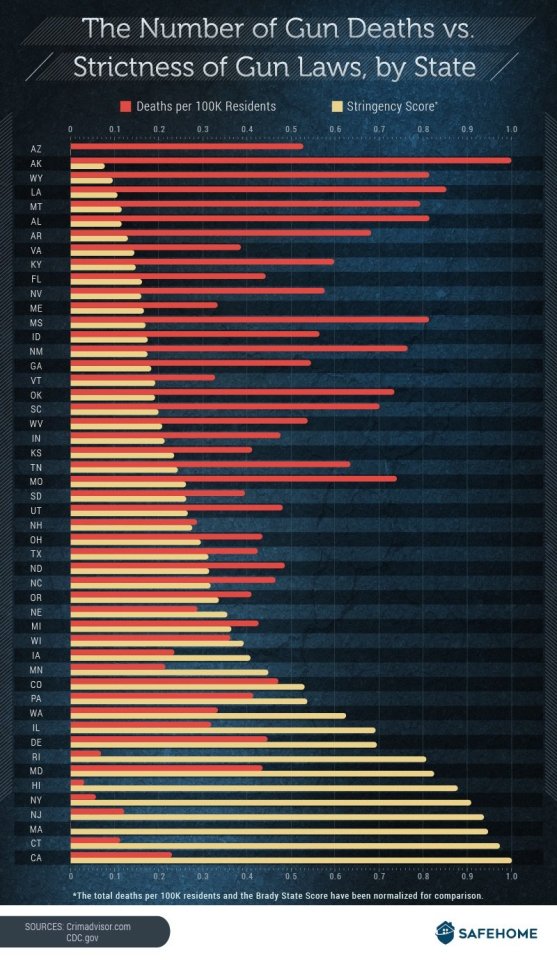
Ok, finally, on to fascism. So, let's start from the top and work our way to different outcomes. We have our first decision at "Is the current gun violence rate and mass shooting epidemic within the US worth fixing?" Personally, I think yes. If you think no, I invite you to tell that to anyone who lost a family member in a mass shooting and see if you don't get punched.
Having resolved yes, we move onto what to do. There are three real solutions.
1. Increase of law enforcement
2. Increase of surveillance
3. Regulation of firearms
Notably, mental health reforms is left off this list. I've addressed that several times in other posts. In summary, mass shooters don't seek mental services and the majority of perpetrators aren't mentally ill, they're disillusioned with society.
Now, as a liberal and specifically a social liberal, I hate fascism and think that among the political ideologies out there fascism and authoritarianism are a special kind of evil. In general, I see it as better to have a large government which serves the people instead of a small government which oppresses the people. A lot of conservatives, especially anarco-capitalists, think that a small government is necessarily less oppressive, but that is not true. Governments can be large, but if they are beholden to a citizenship, they'll obey said citizens. Small governments who are isolated from the populace easily turn towards oppression.
But I digress. Let's start with the first choice, and see where it takes us. For this exercise, we'll be assuming that when the government is given control over a certain aspect of our lives, they'll want to increase that control. So, we increase the law enforcement in all major metropolitan areas, meaning armed guards at malls, churches, movie theaters, schools, etc. And even though mass shootings still occur when armed guards are present (Parkland) or when police arrive on scene within the minute (El Paso), it's okay because we get to keep our guns, everybody has a gun so everyone is safe. This is basically a police state. The scary thing is conservatives have actually proposed this. Sean Hannity said on live TV that we need to place armed guards at every public area. And if you don't trust the government, how the hell could you trust the armed guards they have stationed outside the grocery store.
Next solution is increased surveillance. If access to guns is to remain unrestricted, then we need to be able to find the killers before they kill. What do all of the mass shooters have in common? An internet history rife with extremism and alt-right views. So, screen everyone. And go ahead and start censoring people who have those views too, just to be safe. But once we have a suspected shooter, how can we know when they're about to commit murder? You can't arrest someone for fitting a profile. So, you start tracking them, looking through their purchases, making sure they aren't trying to get someone to buy them a firearm, following them, watching them. Even if all they did is post on the internet with no intent, now the government knows their every move. And suddenly, the small minor infractions that everyone commits daily start to add up. So, one agent decides to hell with it, let's just bust him early for something, anything we can make stick. This isn't a hypothetical, either. There are countless stories of cops falsifying evidence just to make the arrest because they believe an innocent person is guilty.
Finally, firearm regulation. Now here you might think that if you lose your firearm, you lose your safety. Ignoring for a moment that I specifically advocated for law enforcement to not have firearms, if you genuinely think you are safer with a gun than without it, you are wrong. The mindset that, without your gun, there's nothing to stop the government from trampling your rights ignores the fact that even with your gun, there's nothing really stopping the government from trampling your rights, because the government has a lot more guns than you and they're a lot bigger. Now, perhaps you think that having an armed populace means a resistance or insurgency is possible. Ignoring that the government could squash any insurgency within the US, who even says the insurgents are on your side politically? What's stopping them from rising up right now? The same thing that's stopping the government from killing any dissidents: the fact that we live in a society and without it the government would collapse. Often times people speak as though the government is some separate entity when in reality in America every single person who us eligible to vote or pays taxes is a member of the government. We are the power base of the government, and to distinguish between the citizens of the US and the government if the US is a real gray area, because the government can't exist without the economic base that is our society. You called us sheep but we aren't sheep, we're the golden goose and you never ever kill the golden goose. The government won't come to put us all in camps because they'd wake up broke the next day. And even if they did, your gun wouldn't stop them, it just means they'd kill you.
When you arm everyone, you arm EVERYONE. Not just the lawful responsible owner, but the mass shooter, the murderer, the rapist, the insurgents on both the right and the left, the domestic terrorists, the gang bangers, the government sympathizers, the government itself, everyone. And while obviously it's not every gun owner, it could be any gun owner. And any realistic way to distinguish the difference between a responsible individual looking to own a gun and a mass shooter arming up is with a level of invasiveness that should make you incredibly uncomfortable. This is what I mean when I talk about surveillance.
Let's come to a conclusion here, because this post has gotten quite long.
The idea that you could amass enough firepower to resist the government is not reasonable. What protects you from the government is not weaponry but anonymity. Currently, our system has both, but having both allows criminals and murderers to readily access firearms and kill people. So, since the weaponry isn't protecting us anyway, might as well get rid of it and save some lives.
EDIT: The blog that sent these messages no longer exists, and I don't have access to them anymore, so I'm glad I screenshoted when I did. Kinda confirms my suspicion that they just wanted to anonymously harass me. Oh well, nothing as predictable as a coward.
0 notes